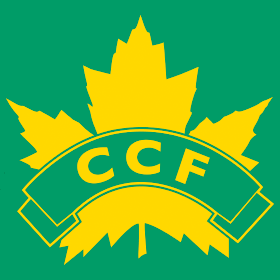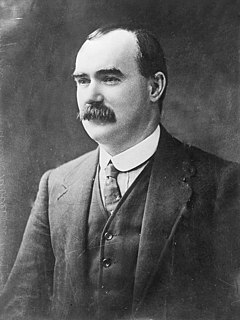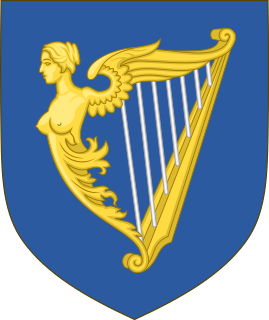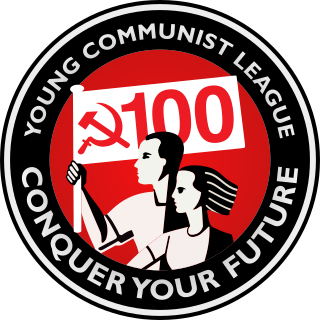Related Research Articles

The Nazi Party, officially the National Socialist German Workers' Party, was a far-right political party in Germany active between 1920 and 1945, that created and supported the ideology of Nazism. Its precursor, the German Workers' Party, existed from 1919 to 1920. The Nazi Party emerged from the German nationalist, racist and populist Freikorps paramilitary culture, which fought against the communist uprisings in post-World War I Germany. The party was created to draw workers away from communism and into völkisch nationalism. Initially, Nazi political strategy focused on anti-big business, anti-bourgeois, and anti-capitalist rhetoric. This was later downplayed to gain the support of business leaders, and in the 1930s the party's main focus shifted to antisemitic and anti-Marxist themes.

The Co-operative Commonwealth Federation (CCF) was a democratic socialist and social-democratic political party in Canada. The CCF was founded in 1932 in Calgary, Alberta, by a number of socialist, agrarian, co-operative, and labour groups, and the League for Social Reconstruction. In 1944, the CCF formed the first social-democratic government in North America when it was elected to form the provincial government in Saskatchewan.

James Connolly was an Irish republican, socialist and trade union leader. Born to Irish parents in the Cowgate area of Edinburgh, Scotland, Connolly left school for working life at the age of 11, and became involved in socialist politics in the 1880s.

Socialism in New Zealand had little traction in early colonial New Zealand but developed as a political movement around the beginning of the 20th century. Much of socialism's early growth was found in the labour movement.
The Workers Internationalist League was a Trotskyist group in Britain founded in the summer of 1983 by the Internationalist Faction of the Workers Socialist League. It was the British affiliate of the Trotskyist International Liaison Committee until that body was renamed the International Trotskyist Committee.

Jenny Julia Eleanor Marx, sometimes called Eleanor Aveling and known to her family as Tussy, was the English-born youngest daughter of Karl Marx. She was herself a socialist activist who sometimes worked as a literary translator. In March 1898, after discovering that Edward Aveling, her partner and a prominent British Marxist, had secretly married a young actress in June of the previous year, she poisoned herself at the age of 43.

Anarchism in the UK initially developed within the context of radical Whiggery and Protestant religious dissent. Both during the English Civil War and the First Industrial Revolution, English anarchist thought developed in the context of revolutionary working class politics and an anti-establishment ethos.

The Home Rule League (1873–1882), sometimes called the Home Rule Party, was an Irish political party which campaigned for home rule for Ireland within the United Kingdom of Great Britain and Ireland, until it was replaced by the Irish Parliamentary Party. The Home Rule Confederation of Great Britain was a sister organisation in Great Britain.

Victor Luitpold Berger was an Austrian American socialist politician and journalist who was a founding member of the Social Democratic Party of America and its successor, the Socialist Party of America. Born in the Austrian Empire, Berger immigrated to the United States as a young man and became an important and influential socialist journalist in Wisconsin. He helped establish the so-called Sewer Socialist movement. Also a politician, in 1910, he was elected as the first Socialist to the U.S. House of Representatives, representing a district in Milwaukee, Wisconsin.
Big tent or catch-all party is used in reference to a political party's policy of permitting or encouraging a broad spectrum of views among its members. This is in contrast to other parties that defend a determined ideology and seek voters who adhere to that ideology and convince people towards it.
Religious socialism is a type of socialism based on religious values. Members of several major religions have found that their beliefs about human society fit with socialist principles and ideas. As a result, religious socialist movements have developed within these religions. Those movements include Buddhist socialism, Christian socialism, Islamic socialism and Jewish socialism. According to the Encyclopedia Britannica Online, socialism is a "social and economic doctrine that calls for public rather than private ownership or control of property and natural resources. According to the socialist view, individuals do not live or work in isolation but live in cooperation with one another. Furthermore, everything that people produce is in some sense a social product, and everyone who contributes to the production of a good is entitled to a share in it. Society as a whole, therefore, should own or at least control property for the benefit of all its members. [...] Early Christian communities also practiced the sharing of goods and labour, a simple form of socialism subsequently followed in certain forms of monasticism. Several monastic orders continue these practices today".

The Network, whose complete name was Movement for Democracy – The Network, was a political party in Italy led by Leoluca Orlando.
The name "Whitechapel Boys" identifies a loosely-knit group of Anglo-Jewish writers and artists of the early 20th century. It is named after Whitechapel, which contained one of London's main Jewish settlements and from which many of its members came. These members included Mark Gertler, Isaac Rosenberg, David Bomberg, Joseph Leftwich, Jacob Kramer, Morris Goldstein, Stephen Winsten, John Rodker, Lazarus Aaronson and its only female member, Clara Birnberg.
The Ottoman Socialist Party was the first Turkish socialist political party, founded in the Ottoman Empire in 1910.

The Young Communist League (YCL) was the youth wing of the Communist Party of Great Britain from 1921 to 1988. Since 1991, the YCL has been the youth section of the Communist Party of Britain.

The British Socialist Party (BSP) was a Marxist political organisation established in Great Britain in 1911. Following a protracted period of factional struggle, in 1916 the party's anti-war forces gained decisive control of the party and saw the defection of its pro-war right wing. After the victory of the Bolshevik Revolution in Russia at the end of 1917 and the termination of the First World War the following year, the BSP emerged as an explicitly revolutionary socialist organisation. It negotiated with other radical groups in an effort to establish a unified communist organisation, an effort which culminated in August 1920 with the establishment of the Communist Party of Great Britain. The youth organisation the Young Socialist League was affiliated with the party.
The first Revolutionary Socialist League (RSL) was formed in early 1938 by the merger of the Marxist League led by Harry Wicks and the Marxist Group led by C. L. R. James.

Far-left politics in the United Kingdom have existed since at least the 1840s, with the formation of various organisations following ideologies such as Marxism, revolutionary socialism, communism, anarchism and syndicalism.

Socialism inIran or Iranian socialism is a political ideology that traces its beginnings to the 20th century and encompasses various political parties in the country. Iran experienced a short Third World Socialism period at the zenith of the Tudeh Party after the abdication of Reza Shah and his replacement by his son, Mohammad Reza Pahlavi. After failing to reach power, this form of third world socialism was replaced by Mosaddegh's populist, non-aligned Iranian nationalism of the National Front party as the main anti-monarchy force in Iran, reaching power (1949–1953), and it remained with that strength even in opposition until the rise of Islamism and the Iranian Revolution. The Tudehs have moved towards basic socialist communism since then.
References
- 1 2 Barberis, Peter; McHugh, John; Tyldesley, Mike, eds. (2000). "571: Young Socialist League". Encyclopedia of British and Irish Political Organizations: Parties, Groups and Movements of the Twentieth Century (revised ed.). Pinter. p. 173. ISBN 1-85567-264-2.
- ↑ Patterson, Ian (2013). "The Translation of Soviet Literature". In Beasley, Rebecca; Bullock, Philip Ross (eds.). Russia in Britain, 1880-1940: From Melodrama to Modernism. Oxford University Press. p. 189. ISBN 978-0-19-966086-5.
- ↑ Moorcroft Wilson, Jean (2009). Isaac Rosenberg: The Making of a Great War Poet: A New Life (U.S. ed.). Northwestern University Press. pp. 85, 98, 101, 181. ISBN 978-0-8101-2604-6.